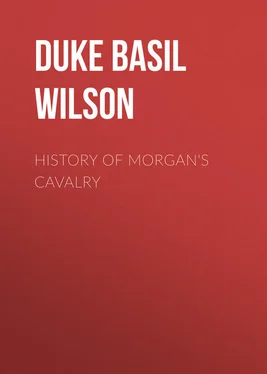Basil Duke - History of Morgan's Cavalry
Здесь есть возможность читать онлайн «Basil Duke - History of Morgan's Cavalry» — ознакомительный отрывок электронной книги совершенно бесплатно, а после прочтения отрывка купить полную версию. В некоторых случаях можно слушать аудио, скачать через торрент в формате fb2 и присутствует краткое содержание. Издательство: Иностранный паблик, Жанр: foreign_antique, foreign_prose, на английском языке. Описание произведения, (предисловие) а так же отзывы посетителей доступны на портале библиотеки ЛибКат.
- Название:History of Morgan's Cavalry
- Автор:
- Издательство:Иностранный паблик
- Жанр:
- Год:неизвестен
- ISBN:нет данных
- Рейтинг книги:3 / 5. Голосов: 1
-
Избранное:Добавить в избранное
- Отзывы:
-
Ваша оценка:
- 60
- 1
- 2
- 3
- 4
- 5
History of Morgan's Cavalry: краткое содержание, описание и аннотация
Предлагаем к чтению аннотацию, описание, краткое содержание или предисловие (зависит от того, что написал сам автор книги «History of Morgan's Cavalry»). Если вы не нашли необходимую информацию о книге — напишите в комментариях, мы постараемся отыскать её.
History of Morgan's Cavalry — читать онлайн ознакомительный отрывок
Ниже представлен текст книги, разбитый по страницам. Система сохранения места последней прочитанной страницы, позволяет с удобством читать онлайн бесплатно книгу «History of Morgan's Cavalry», без необходимости каждый раз заново искать на чём Вы остановились. Поставьте закладку, и сможете в любой момент перейти на страницу, на которой закончили чтение.
Интервал:
Закладка:
As the Big Black river is navigable for small craft at all seasons, General Hardee had no difficulty in supplying the troops stationed at Pocahontas, but after leaving that point he was compelled to depend for supplies upon wheel transportation, with which he was very indifferently provided, and upon the country, which was sterile and sparsely settled.
The only line of advance from Pocahontas which gave promise of important results, or which, indeed, was practicable, was by Greenville, distant some fifty-five or sixty miles from Pocahontas, and Frederickton, to Ironton, and thence along the Iron Mountain Railroad by the most practicable roads to St. Louis. The country between Pocahontas and Ironton is rugged and heavily wooded. It is penetrated by few roads, and, in 1861, by no means abounded in supplies. General Hardee advanced as far as Greenville, and threatened Ironton.
This latter place, the terminus of the Iron Mountain Railroad, is ninety-seven miles from St. Louis. It is a place of great natural strength, and was already, at the time that Hardee advanced toward it, partially fortified. General Hardee expected when he moved from Pocahontas to effect a junction with General Pillow at Frederickton, a small town to the east of north of Greenville, twenty miles from Ironton and on the line between that place and New Madrid. Pillow's force was six or eight thousand strong, and the best armed and accoutered of all the western Confederate commands.
General Pillow could very easily have reached Frederickton from New Madrid, as soon as Hardee could have gotten to the former place from Pocahontas, had there been a timely and definite understanding between them to that effect. And the united strength of the two Generals, with the addition of some two thousand of the State-guard, which were at hand under General Jeff. Thompson (as well armed and better organized than those which had already done such excellent service under Price), would have enabled them, most probably, to take Ironton. At any rate, by flanking and threatening to get between that place and St. Louis, they would certainly have compelled its evacuation, and then, either defeating the garrison in the open field, or driving it back in disorder and demoralization upon St. Louis, they would have become masters of the situation. They would have cut off and destroyed the defeated and routed army of Lyon, then in full flight for St. Louis.
General Price would have gladly embraced the opportunity of uniting with them – the whole State would have risen to join them. It is almost certain, when the number and condition of the Federal troops then in Missouri are taken into consideration, and the facts that but few troops were available from the neighboring States for the defense of St. Louis, and that the city was not fortified – it is almost positively certain, that St. Louis would have fallen into their hands, and that the entire State of Missouri, at least all South of the Missouri river, would have passed securely into their possession. At all events, General Hardee was extremely desirous of attempting just such a campaign.
It was deemed, however, more important, at that time, to occupy and fortify Columbus, in Kentucky, situated on the Mississippi river, some twenty-two miles below the mouth of the Ohio. This measure, it was thought, would protect the States lying along the Mississippi from invasion, by enabling the Confederates to hold the river, as it was by the river, only, that those States could be conveniently reached. General Pillow's forces were consequently ordered to that point. Finding that his plans were rendered impossible of execution, on account of the want of General Pillow's co-operation, Hardee returned to Pocahontas, and was shortly afterward transferred, with the greater portion of the troops under his command, to the eastern side of the river, and was ordered to Bowlinggreen as soon as that place was occupied. Up to the date of General Johnston's taking command, the chief difficulty in the way of action and decisive operations in the West (independently of the inferior number and miserable equipment of the troops) was the lack of uniformity and concert in the plans and operations of the various commanders. There was no one in supreme military control from whom the subordinate Generals could receive definite instructions, and orders which they felt obliged to obey. While an immense extent of country was included in one Department, and theoretically under one chief, yet practically every officer, no matter what was the strength or nature of his command, who happened not to be troubled with a senior immediately at his elbow, planned and acted for himself and with a perfect indifference to the operations of every one else. The President and Secretary of War were too distant to do any good, if such interference ever does any good, and a ruling mind was needed at the theater of events. It is true that General Polk, whose headquarters were at Memphis, was senior to the others, he being a Major-General, and all the rest but Brigadiers, and he was ostensibly in chief command and directed to a certain extent, the movements of all.
But, whether it was that, in a period when nothing was fairly organized, his authority was not clearly defined, or that he felt some hesitation in vigorously exercising it, it is certain that each of the Generals, who have been here mentioned, acted as if he knew himself to be, to all intents and purposes, in independent command.
This evil was completely remedied by the appointment to the chief command in the West of General Johnson, and the prompt and decided measures which he instituted. General Johnson's whole life had been one of the most thorough military training, and no officer of his years in the old army of the United States had seen more service; but more than that, he was a soldier by instinct, and Nature had intended him for military command.
He felt the full importance of careful preparation, and the establishment by order and system in every branch and department of the service. No martinet of the schools was ever more alive to the necessity of rigid method and exact discipline, for he knew that without their inauguration and strict observance, it would be impossible to even partially discharge the duties of his vast commission. But he also saw clearly the vital necessity of maintaining in tact the spirit which animated the men of his army, and which had summoned them into the field. He knew that to impair the ardor which had induced them to become soldiers was to destroy their morale; that to attempt to make them machines would result in making them worthless.
Although the troops at his disposal seriously needed instruction and more perfect organization, he did not waste precious moments in seeking to impart them then. He did not permit the high spirit of his gallant army to sink into lethargy, nor the interest which the people felt in the conduct of military affairs to abate by remaining inactive, and in a position which would reduce him, under all circumstances, to the defensive. A concentration of his forces any where upon the Tennessee border would not only have placed him at great strategic disadvantage, but would have been instantly accepted by the soldiery and the people as a signal of his intention to await the pleasure and movements of his adversary. Almost immediately after his arrival at Nashville, the troops which had collected at Camp Boone, the rendezvous of the Kentucky regiments, and the Tennessee troops which were available, were pushed into Kentucky. Kentucky's neutrality, for a time recognized provisionally, and so far as a discreet silence upon the subject amounted to recognition by the Federal Government, had already been exploded. The Government of the United States, having made the necessary preparations, was not disposed to abandon a line of invasion which led right to the vitals of the Confederacy, and promised a successful reduction of the rebellion in at least three of the seceded States, because of the partially rebellious attitude assumed by Kentucky.
Читать дальшеИнтервал:
Закладка:
Похожие книги на «History of Morgan's Cavalry»
Представляем Вашему вниманию похожие книги на «History of Morgan's Cavalry» списком для выбора. Мы отобрали схожую по названию и смыслу литературу в надежде предоставить читателям больше вариантов отыскать новые, интересные, ещё непрочитанные произведения.
Обсуждение, отзывы о книге «History of Morgan's Cavalry» и просто собственные мнения читателей. Оставьте ваши комментарии, напишите, что Вы думаете о произведении, его смысле или главных героях. Укажите что конкретно понравилось, а что нет, и почему Вы так считаете.












